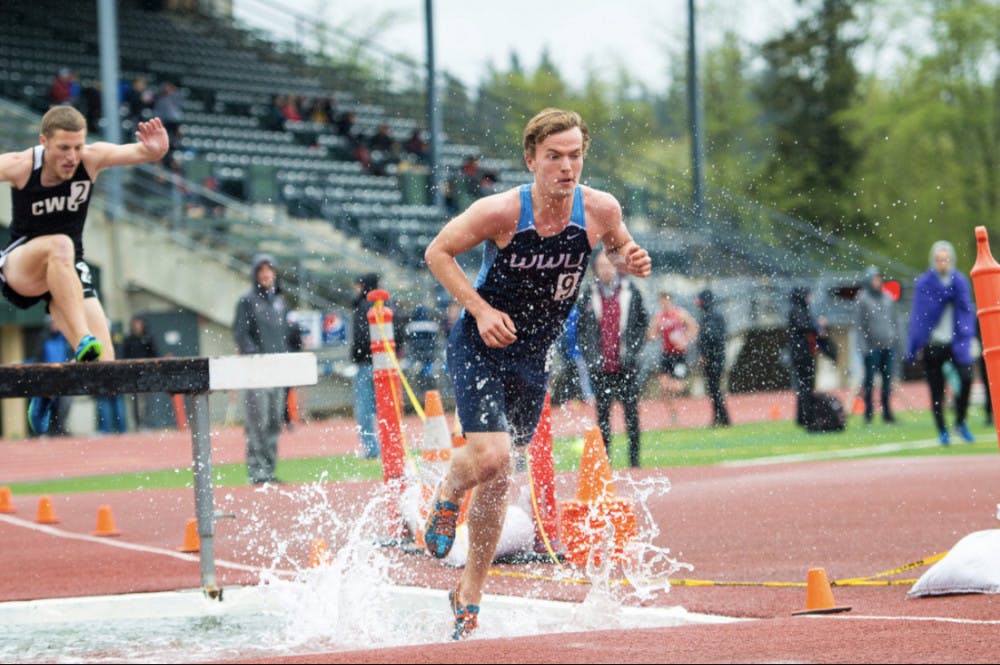The Western cross country team held an in-person time trial with a group of athletes to end their season

By Ryan Myrvold
On a clear Halloween morning, a small group of athletes on Western Washington University’s cross country team assembled on the track near the Wade King Student Recreation Turf Field, preparing to run a 5K time trial.
Pee Wee Halsell, the head coach of Western’s track and cross country teams for 34 seasons, said the trial made for a very fun morning.
“I think [the time trial] was great,” Halsell said. “It was fun to watch them go compete, and they competed well and they ran well.”
Halsell also said the team’s desire to train despite not having a season this year was inspiring.
Mac Franks, a senior on the cross country team who ran in the time trial, said it was a great way to demonstrate their accomplishments.
“We wanted to do something that showcased all the progress we’ve made over the summer running our mileage,” Franks said. “So we wanted to put together a time trial to go sub-15 minutes in the 5K, which is a pretty decent barrier.”
Franks said he and his usual running-mates during the season were able to run the trial in under 15 minutes.
“To do that together, as a team, in solidarity, was something really special,” Franks said. “To come together in these trying times of [COVID-19] was something even more impressive.”
Franks said the social distancing restrictions, while understandable and effective, made training more difficult this season.
“[Cross country] seems like an individual sport because we’re racing, but it’s hard to put in as many miles as we do without being able to run with a bunch of guys,” Franks said. “[COVID-19] has impacted us kinda negatively in that aspect because we have to split our groups up when we want to run together.”
Social distancing guidelines for COVID-19 ensured athletes could not run in groups with more than five people at first, Franks said, but the guidelines gradually relaxed to allow slightly larger groups. Most of the men’s cross country team is on campus, while some members of the men’s team and most of the women’s team are off campus training virtually, he added.
“People are still getting their training done with the coaches through Zoom and running their miles alone,” Franks said. “But it’s much easier to have all the guys kinda together.”
Franks said the athletes on the team wear face masks through their entire run and socially distance on their routes.
Annika Taylor, a junior on the team who did not participate in the trial, said the distancing restrictions made practicing harder because of the lack of connection with teammates and the force teammates have to hold each other accountable.
“No one can make you run the miles you need to run,” Taylor said “A major take away is self-reliance and make sure that you’re doing the best you can despite the absence of others.”
Taylor said time trials are a way to reduce the disappointment of not having a season and are a way to give the athletes something to show for their achievements.
“Part of the point of competitions is to have something to work for and also to have the work that you put in be recognized — not just by other people but yourself,” Taylor said. “If you have a good race, you know it’s because you put in all that work.”
Scott Graupensperger, a postdoctoral fellow at the University of Washington who has a doctorate in kinesiology and clinical transition science, contributed to a study that examined how social connections between athletes shape their athletic identity during the COVID-19 pandemic.
Graupensperger said the time trial was a good idea after the cancellation of the season and likely gave the athletes something to look forward to.
“That definitely gives them something to work toward, there’s a goal in mind, something that they can train for,”Graupensperger said. “So I’m sure that just raised spirits, just having something that was fun and they were able to look forward to and get out there and compete.”
Graupensperger said the social aspect being part of a sports team is still valuable to the athletes even if it does not directly involve athletics, meaning social connection and cohesion as a team is still possible as practices go virtual.



![IMG_9055_Original[1].jpg](https://snworksceo.imgix.net/wfw/225b9e60-06a0-4bbd-837f-36435becd1eb.sized-1000x1000.jpg?w=1500&ar=16%3A9&fit=crop&crop=faces&facepad=3&auto=format)

